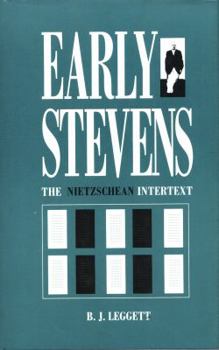Early Stevens: The Nietzschean Intertext
Select Format
Select Condition 
Book Overview
In recent years Nietzsche has emerged as a presiding genius of our intellectual epoch. Although scholars have noted the influence of Nietzsche's thought on Wallace Stevens, the publication of Early Stevens establishes, for the first time, the extent to which Nietzsche pervades Steven's early work. Concentrating on poems published between 1915 and 1935--but moving occasionally into later poems, as well as letters and essays--B. J. Leggett draws together texts of Stevens and Nietzsche to produce new and surprising readings of the poet's early work. This intertextual critique reveals previously undisclosed ideologies operating at the margins of Stevens's work, enabling Leggett to read aspects of the poetry that have until now been unreadable. Leggett's analysis demonstrates that the Nietzschean presence in Stevens brings with it certain assumptions that need to be made explicit if the form of the poetry is to be understood. Though many critics have discussed the concept of intertextuality, few have attempted a truly intertextual reading of a particular poet. Early Stevens not only develops an exemplary model of such a reading; it also provides crucial insights into Stevens's notions of femininity, virility, and poetry and elucidates the notions of art, untruth, fiction, and interpretation in both Stevens and Nietzsche.
Format:Hardcover
Language:English
ISBN:0822312018
ISBN13:9780822312017
Release Date:March 1992
Publisher:Duke University Press
Length:225 Pages
Weight:1.35 lbs.
Dimensions:1.1" x 6.2" x 9.5"
Customer Reviews
0 rating





